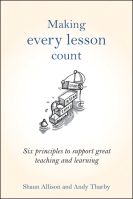Today a group of teachers met as a ‘Learning Development Group’ to look at developing outstanding teaching and learning. We looked at each of the ‘outstanding’ OFSTED criteria, and then considered how they could be easily implemented in the classroom.
Taking inspiration from David Brailsford (British Cycling’s Performance Director), we looked at the principle of marginal gains:
“The whole principle came from the idea that if you broke down everything you could think of that goes into riding a bike, and then improved it by 1%, you will get a significant increase when you put them all together.”
David Brailsford, summer 2012
Following on from recent blog posts from David Didau and Zoe Elder (see links below) we are applying the same pronciple to move from good to outstanding teaching and learning.
The results of the discussion follow:
Almost all pupils, including disabled pupils, those who have special educational needs and those for whom the pupil premium provides support, are making rapid and sustained progress.
- In order to make progress, students need to have a clear understanding of their learning starting points and where they are aiming.
- Teachers then need to be able to use the assessment criteria to set improvement strategies and ask appropriate questions.
- Students should know what they have to do to improve – specific to that subject.
- Have examples of graded work to show students – or only show A* work, to raise aspirations.
- Give students time to think and answer questions – think, pair, share works well.
The teacher has consistently high expectations of all pupils. They plan and teach lessons that enable all pupils to learn exceptionally well.
- Plan for peer and self-assessment – but consider how student understanding of the assessment criteria will be developed.
- Colour coded seating plan, depending on ability (or just have their target level/grade on your seating plan) – helps targeted questioning.
- Plan questions to push the more able.
- Don’t just give the more able more work, make it different and challenging.
- Make good use of TAs. Be prescriptive to the TA about what you want that student/s to achieve that lesson and then check with them throughout and at the end of the lesson.
- Make sure expectations are high in terms of behaviour and learning.
Teachers systematically and effectively check pupils’ understanding throughout lessons, anticipating where they may need to intervene and doing so with notable impact on the quality of learning.
- Use the Red, Amber and Green cards to show understanding – and who to intervene with (students can have these out on their desk at the colour that shows their level of understanding).
- Plan activities that will allow students to demonstrate their learning – against learning objectives.
- Use random questioning techniques e.g. lollipop sticks.
- Read out students work and then discuss it.
- Refer back to the learning objectives regularly during the lesson.
- Plan the key questions you will ask at varying points of the lesson, to assess the key learning points.
- At the end of the lesson get students to consider – 3 things they have learnt and 3 things they want to find the answer to.
The teaching of reading, writing, communication and mathematics is highly effective and cohesively planned, where appropriate.
- Develop the use of extended writing e.g. how can connectives be used in your subject?
- Correct spellings.
- Encourage students to use a key word glossary.
- Develop active learning strategies e.g. learning race (get a question, take it back to your group, group then has to research answer…quickly); Running commentary – show a video/powerpoint – students have to plan a commentary
Teachers and other adults generate high levels of engagement and commitment to learning across the whole school.
- Keep the learning relevant – make sure your own knowledge is up to date.
- Discuss the context of the learning – why are we learning it?
- Keep teaching talk low and student talk (productive!) high!
Consistently high quality marking and constructive feedback from teachers ensures that pupils make rapid gains.
- Students write a response to teacher marking.
- Teacher writes formative comment – highlights key bit. Student copies highlighted section onto progress tracker sticker. Teacher dates and stamps this student comment once they have achieved it.
- Give students the opportunity to respond to marking, by redrafting.
- Be specific and concise with formative comments.
- Talk to students and the class about what you have noticed from marking their books – good and bad.
Teachers use well-judged and often inspirational teaching strategies, including setting appropriate homework that, together with sharply focused and timely support and intervention, match individual needs accurately. Consequently, pupils learn exceptionally well.
- Students have a choice of homework tasks – directed to attempt particular ones based on ability.
- Set homework tasks that allow collaborative working and the use of different media.
Pupils’ attitudes to learning are exemplary.
- Students must feel like they are improving – through regular marking and formative comments.
- Use an engaging ‘hook’ at the start of your lesson.
- Plan lessons with enjoyment in mind.
- Model a positive attitude – smile, be nice, be helpful, show that you enjoy their company.
- Praise students for their work and effort throughout the lesson.
Skilled and highly consistent behaviour management makes a strong contribution to an exceptionally positive climate for learning, including from individuals or groups with particular behaviour needs.
- Need a balance between ‘assertive’ behaviour management and creating a climate where students feel comfortable to express their ideas and get things wrong.
- Stay calm.
- Separate the child from the behaviour
- Catch them being good – and then praise this.
- Be specific with praise.
- Model good behaviour – say ‘thank you’
Further reading:










Pingback: 2012-13 and all that….. | Class Teaching